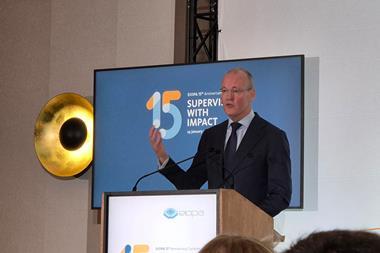EUROPE - FTSE 100-listed companies have sought to reduce their pension liability risk within the last year by re-weighting assets by an average 7% to bonds, suggests a study published by Pension Capital Strategies.
An investigation of the FTSE 100 company reports for 2007/08 year by Pension Capital Strategies and Cazenove, part of JP Morgan Cazenove, found the asset allocation to fixed income for most FTSE company pension funds increased in the last financial year from 40% to 47%, on average - the largest 12-month shift in investments for over 20 years, according to the report.
That means the bond holdings at these companies had increased by more than a third, to the end of 31 March 2009, in the space of just two years.
The financial situation of these pension funds is likely to have deteriorated, in many cases, since financial reports were published last year as the official financial year extended from 31 March 2008, in the case of BT and Vodafone, to 31 December 2008, at BP and Royal Dutch Shell, and conditions deteriorated considerably between those dates.
Within its analysis of the asset allocation breakdown and pensions assessment, PCS also found were the 88 companies who disclosed pension surpluses and deficits then have done so today, it is likely that just 15 would now have a surplus because of the impact of a shift in AA corporate bond yields on assets and liabilities, as well as the losses to equities in last year's trading conditions.
A close inspection of pension arrangements, whether funded or unfunded, found Cable & Wireless to be the best funded pension plan within the analysis as it was 120% funded with £2.34bn (€2.6bn) in assets to 31 March 2008.
Among the other major funds assessed, Rolls Royce, the engine manufacturer, was found to be 114% funded with £7.44bn in assets at 31 December 2008, contrasting strongly with BAE Systems, which carried assets of £13bn but was 76% funded as it had liabilities of £17.1bn.
PCS also claimed several of the major funds, including BAE Systems, are still running investment mismatches with their pensions investment strategies as BAE, for example, has just 30% in bonds despite its liabilities.
High street retailers Kingfisher and Morrison were found to have made the largest changes in terms of equity-to-bonds ratio as it was last calculated as having bond allocations of 63% and 62% respectively, compared with 42% and 41% prior to that - a leap of 21 percentage points.
And Royal Dutch Shell has the largest total pensions liability of its FTSE 100 counterparts, according to PCS' analysis, as it has liabilities of £36.37bn globally, followed by BT with £34.67bn.
Based on these analyses, PSC has predicted the total pensions deficit of FTSE 100 companies at the end of March 2009 was £50bn, which in itself is a substantial drop from £86bn in the year ending March 2008.
BT is one of the companies anticipated to be reporting a major widening of its pensions deficit later this week, when it unveils its 2008/09 financial results.
If you have any comments you would like to add to this or any other story, contact Julie Henderson on + 44 (0)20 7261 4602 or email julie.henderson@ipe.com












